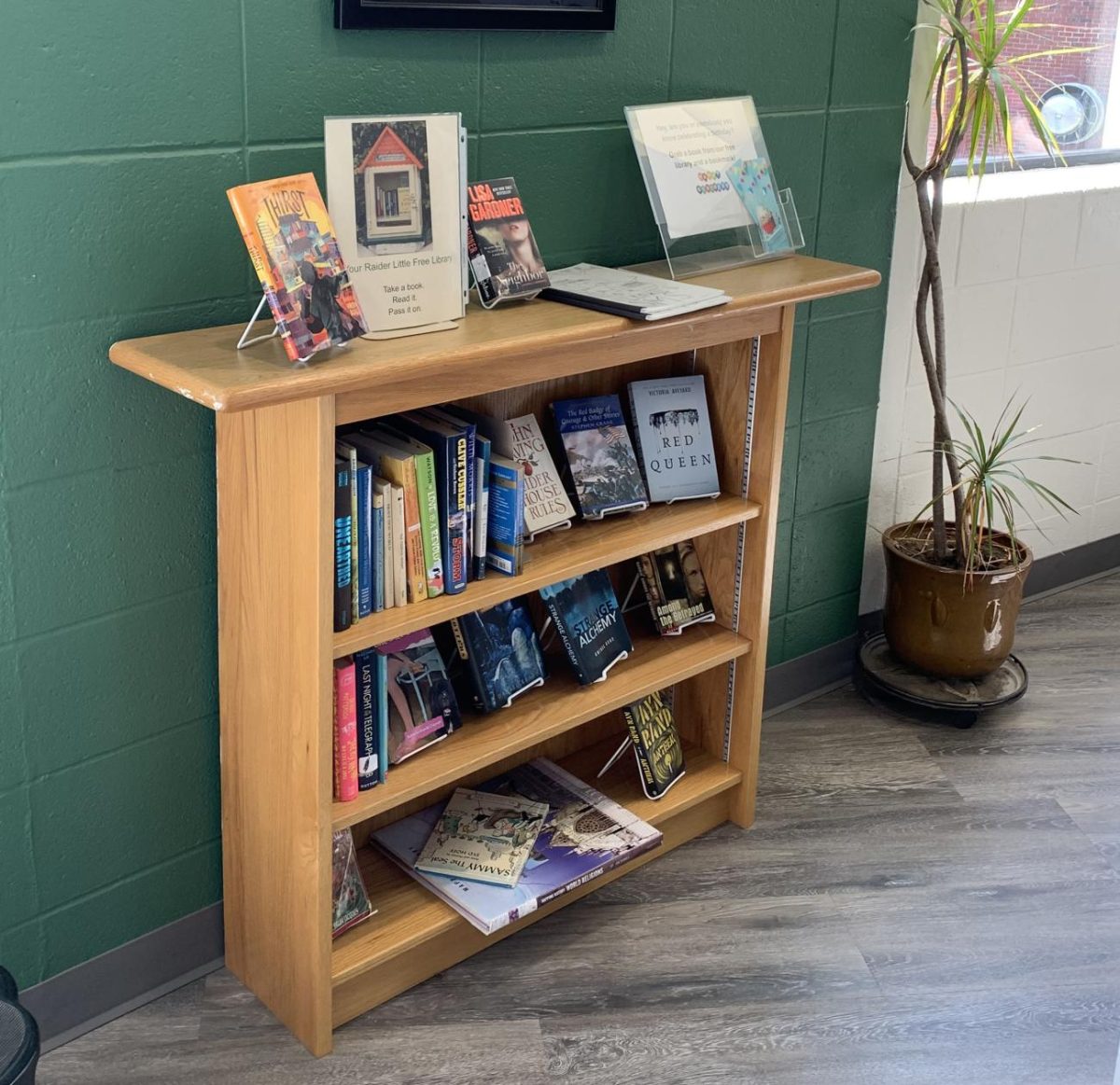In August, when much of the rest of this year’s senior class will be moving into college dorms, Ace Cofield will be flying 2,300 miles to Panama City, Panama. He plans to work as a chef at La Tapa Del Coco, an Afro-Panamanian joint in the heart of the city.
Last May, Cofield was personally recruited by the restaurant’s founder and head chef, Isaac Villaverde. He first met Villaverde during his culinary class at the Center for Academic Achievement (CAA) last year. The Panamanian chef was visiting Kansas City as part of a “Barbecue Across America” tour, and was invited by one of the culinary instructors to visit the CAA. Almost instantly after Villaverde met Cofield, they began cooking together at the CAA’s Broadmoor Bistro.
“[Villaverde] already had an idea of what he wanted to make, but he asked me for my thoughts,” Cofield said. “Then he wrote my name next to his on the menu, and we started cooking.”
Cofield was nervous working alongside a professional chef, but he relied on his culinary training. They cooked pickled peppers and jalapenos that Villaverde had brought from Panama. The main course included red beans and rice, along with fried fish in an orange turmeric marinade. Altogether, the meal served about 20 people.
“Everything was so good, and I even still have that fish marinade in my freezer,” Cofield said, chuckling. “I should probably throw that away.”
Although Villaverde had much more cooking experience than Cofield and came from a different cultural background, he made the younger chef feel comfortable.
“There was no empty space in the time that we cooked together. It didn’t feel forced…it felt like a kind of flow state,” Cofield said.
As they sizzled fish and sauteed vegetables, Villaverde struck up a conversation with Cofield, asking about his family and why he loves to cook. Villaverde even introduced Cofield to his two-hundred thousand Instagram followers and posted photos of the two of them together on Stories.
“I didn’t realize what he was saying at first,” Cofield said. “I was just sitting there, mixing up the marinade for the fish, and he’s on Instagram stories saying, ‘Ace is coming to Panama!’”
Cofield’s love for cooking began with his family. He fondly remembers seeing his parents and grandparents in the kitchen as a kid.
“Culturally, food is such a big part of my life. My grandfather makes the best ribs I have ever had…and our fried chicken recipe is amazing,” Cofield said. “Growing up, I would go to my grandparents’ house and we would watch Chopped on Food Network for hours.”
This early exposure to cooking is what inspired Cofield to take the culinary class at the CAA during his junior year. Soon after, he landed his first restaurant job at a bar and deli in Olathe.
“I was able to take my knowledge of what I learned in culinary school and apply it to working at a restaurant,” Cofield said. “They were two completely different experiences. [The CAA] was definitely more of a controlled environment.”
Thanks to the safe sanitation practices and knife skills he was taught at culinary school, Cofield felt well-prepared to handle the demands of a restaurant environment. However, his foray into a professional kitchen introduced new challenges.
“I might come in and have my coworker cursing me out. He might come into work drunk, I’d have to work a whole service by myself,” he said. “If you don’t know how to handle it, it can be a toxic, challenging environment.”
Cofield’s first experience working in a commercial kitchen was not ideal, but he responded to each adversity with poise and confidence. When the kitchen flooded with sewage water and his boss asked him to keep working, he did his best to maintain high standards of food safety and cleanliness.
“If I opened up my own restaurant, it would not operate like that. But I knew I just [had] to do what was right and keep going. You have to eat the meat and throw away the bones,” he said.
For Cofield, the substandard environment taught him to stick to his principles as a chef. It also forced him to perfect certain skills on the job, such as selecting the ripest tomatoes or ensuring that fresh produce didn’t go to waste.
“Many things went bad in that kitchen very fast, so I had to think, ‘How can I get the most out of this product in five days, instead of seven days, because the walk-in [freezer] went out?’” Cofield said. “It was a process.”
Cofield quit about a week after the sewage incident, realizing that the bar and deli was not a healthy work environment. He then began walking into restaurants in downtown Kansas City to ask if they were hiring. He filled out as many applications as he could. A few days later, he received a text from Michael Smith, a James Beard Award-winning chef, asking if he was still interested in a job. Cofield was ecstatic.
“I just so happened to be home from school that day, so I rushed over [to interview], and I got the job the same day,” he said. “It was perfect.”
Cofield was hired to cook at a Farina, a high-end Italian restaurant in the Crossroads that Smith owns. He never got the chance to start the job. The next day in culinary class, he cut nearly three inches off the tip of his thumb.
“I chopped a whole chunk of it off when I was trying to cut a lemon, and I had to go to the ER,” he said. “When life gives you lemons, I guess.”
Cofield wasn’t able to work while his thumb was healing, so he told Smith what happened and ended up losing the job at Farina. Once again, it was up to Cofield – a high school culinary student with a dream – to put himself out there. He emailed Mark L. Ching, the executive chef at Loew’s Hotels, requesting an interview. A few weeks later, he heard back.
“I had the meeting with Chink, got the job, and boom: I’ve been working at Loew’s ever since,” he said.
Cofield discusses his professional experience with a trademark humility that makes it seem deceptively simple, but he wouldn’t be a chef at Loew’s Hotels or have a guaranteed job in Panama City if he wasn’t persistently dedicated to his craft. Few high school students have worked in commercial kitchens, and even fewer are invited to cook in restaurants overseas. Cofield says his ambition comes from the person that knows him best – his mom.
“My mom has really impacted who I am and the man I want to be,” Cofield said. “She’s one of the strongest people I’ve ever seen. She’s had to go through a lot, but just seeing her keep this smile and spark alive, it’s awesome.”
Cofield also gravitates toward the kitchen because he loves serving those around him. He views cooking as a sacred activity.
“When you’re cooking a meal, it’s very intimate,” Cofield said. “It’s a very emotional process, and it’s selfless. You’re literally sweating. Every dish that I make is a piece of me.”
In an admirable manner that is wise beyond his years, Cofield has learned to embrace “the grind” of being a chef. He is relentless, striving to constantly improve and learn from both good and bad circumstances. All the while, he repeats a phrase that his mom taught him when he was young: “Eat the meat, throw away the bones.”
“My mom used to say that all the time, but she doesn’t say it too much anymore because it’s my catchphrase now,” Cofield said. “It’s all about taking away the good and throwing away the bad. You can always take what benefits you.”
When asked about his feelings as he prepares to fly thousands of miles from home, Cofield concedes that yes, he is nervous. He will certainly miss his family, and he knows that La Tapa Del Coco will be different from any restaurant he’s worked at in Kansas City. But he also knows that every new opportunity offers a chance to grow, both as a chef and as a human. And he believes that no matter the cuisine, food provides a sense of center and connection.
“We eat food so we can have fuel, but it’s really about that sense of home. We eat to feel that warm feeling,” Cofield said. “I’m not worried about whether I’m cooking Italian food or Greek food or Ramen noodles; it doesn’t matter. It’s a piece of who I am.”
4/1 Correction: In an earlier version of the story, Mark L. Ching’s last name was spelled incorrectly and has been corrected. The brand “Loew’s Hotels” was also spelled incorrectly and has since been corrected.











